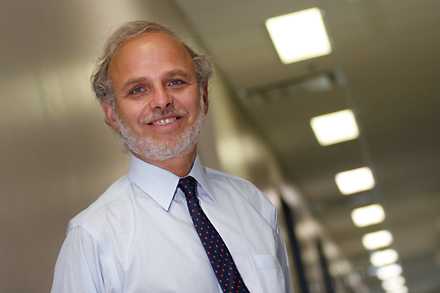
Dr. Michael Pollak has been awarded the 2012 O. Harold Warwick Prize by the Canadian Cancer Society. Pollak was recognized for having had a major impact on cancer control in Canada through his research in understanding the risk of cancer as a function of metabolism.
“This award is greatly appreciated, not just in the context of my own research, but also because it represents recognition of the truly excellent cancer research that is being done at the Lady Davis Institute [LDI] and McGill, even at a time when resources are at a premium,” said Pollak, the Director of Cancer Prevention at the Segal Cancer Centre and at McGill, as well as the Alexander-Goldfarb Chair in McGill’s Department of Oncology. “Though we can never rest on our laurels in this field, we can take heart from the fact that we are making steady progress in our efforts to understand, prevent and target cancer with more effective therapies.”
A quintessential example of the physician-scientist, Pollak manages the care for hundreds of patients at the Segal Cancer Centre, while running a multi-disciplinary lab at the LDI that actively publishes in leading scientific journals. His work spans basic laboratory research, population studies, and clinical trials, and involves collaborations with leading investigators and institutions wordwide.
“I believe that treating patients is helpful in my work as a research scientist. Not only do clinical details from each patient contribute clues to guide further research, but I am constantly confronted with the human urgency that motivates research,” Pollak said.
Pollak focus is on the biological processes that underlie cancers in general, as opposed to honing in on a particular anatomical site. Among the highlights of his career is a landmark paper, published in Science in 1998 with his collaborators at Harvard University, which showed that the risk of prostate cancer varies with the level of circulating insulin-like growth factor. This was one of the first studies to implicate peptide hormones in cancer biology, and is among the most-cited Canadian contributions to global cancer research efforts.
Extensions to this work have shown that many cancers can be growth-stimulated by hormones that are present at different concentrations in different individuals. As the levels of these hormones vary with genetic, dietary and lifestyle factors known to influence cancer risk, this line of research provides clues for novel cancer prevention and treatment strategies.
Another topic under study by Pollak’s research group concerns hormonal control of energy metabolism by cancer cells. When cancer cells behave aggressively, their energy requirements are high, and they can become more sensitive than normal cells to treatment strategies that interfere with utilization of compounds such as glucose to generate energy.
“All of us at the LDI are extremely pleased that Dr. Pollak’s remarkable research has been honoured by the Canadian Cancer Society,” said Dr. Roderick McInnes, Director of the LDI. “His accomplishments in the lab and the clinic have helped to advance our understanding of cancer and to devise effective means for prevention and control. The Warwick Prize is fitting acknowledgement of his wonderful research endeavours.”
“Dr. Pollak’s contributions to the field of cancer prevention research have made him an international leader in this area and he is a deserving recipient of this award,” says Dr. Sian Bevan, director of research for the Canadian Cancer Society. “With this and our other national research awards, the Society is celebrating the achievements and contributions of some of Canada’s leading cancer researchers. They are truly expanding knowledge and changing the way we look at cancer.”
But for Pollak, every discovery is just a steppingstone toward a larger goal. “We recognize the immense challenges of cancer research, and cannot be certain when a breakthrough may occur. But as a clinician, I am grateful for each available treatment that allows me to help a patient, and as a scientist I am grateful for each opportunity to contribute to the global efforts to eradicate cancer.”

Dr.Pollak, all the best for another feather in your cap. You are truly deserving this award for all your contirbutions to the cancer research and making difference in patient’s life.
Renu
Cancer treatment is essential to ensure correct cell improvement in eye area and eliminate abnormal cells in time. Abnormal cells that result in cancerous development divide and develop at a very higher rate and also compel adjacent healthy cells to behave unnaturally and function inefficiently. Abnormal cell development also affects functioning of tissues and causes shortage of generation and provide of essential resources to normal cells in the area. Thus, presence of cancer cells impacts overall well being of eyes.
Almost the entire world wants a remedy for cancer, and it just so occurs that such a cure exists. Sadly, because of the source from the remedy, there has been widespread opposition and disbelief. After the globe comes to accept this medicine, humanity will enter a brand new age of peace and prosperity.